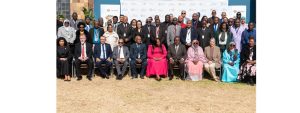 MIDRAND, South Africa – The Pan-African Parliament (PAP) has issued a powerful and unified call for reparative justice, African unity, and institutional reform, aligning with the African Union’s 2025 theme, “Justice for Africans and People of African Descent through Reparations.”
MIDRAND, South Africa – The Pan-African Parliament (PAP) has issued a powerful and unified call for reparative justice, African unity, and institutional reform, aligning with the African Union’s 2025 theme, “Justice for Africans and People of African Descent through Reparations.”
The call was made during the 5th Ordinary Session of the 6th PAP, currently underway in Midrand, South Africa.
Reparative justice emerged as the dominant theme of the session, with delegates emphasising that reparations must go beyond monetary compensation to include symbolic, cultural, legal, and institutional redress.
The historical legacy of slavery, colonialism, and racial discrimination, they argued, continues to contribute to global inequality and hinder Africa’s development.
A highlight of the session was the unanimous adoption of a comprehensive report on reparative justice, presented by hon José Manteigas Gabriel, Rapporteur of PAP’s Committee on Justice and Human Rights. The report proposes a broad framework for reparations that includes cultural restitution, educational reform, development cooperation, and policy transformation.
“The Pan-African Parliament will continue to be a voice for reparatory justice through its legislative and advocacy functions,” hon Gabriel said.
The African Court on Human and Peoples’ Rights, the AU Citizens and Diaspora Organizations (CIDO), and the African Commission on Human and Peoples’ Rights all expressed support for the reparative justice agenda.
Ambassador of CIDO Amr Aljowaily noted that colonialism, slavery, and apartheid have been officially declared crimes against humanity by AU Assembly decisions, and therefore require urgent redress.
Similary, South Africa’s Deputy Minister of International Relations and Cooperation, Thandi Moraka, underscored the broader meaning of reparations.
“Reparations are not just about money,” Moraka said. “They’re about restoring dignity, truth, and opportunity,” said the deputy minister.
She also stressed the need for systemic redress through infrastructure development, educational investment, and the return of stolen African heritage.
The Deputy minister reiterated South Africa’s support for PAP and emphasised that the country’s 2025 G20 presidency will serve as a platform to amplify Africa’s voice on the world stage.
“Let history not say we were silent”
In his keynote address, PAP President hon Chief Fortune Charumbira reiterated the Parliament’s role as the democratic conscience of the African Union. He highlighted its mandate to promote peace, integration, and human rights.
“The Pan-African Parliament was founded to voice the will of the people of Africa and bring democratic legitimacy to the AU,” Charumbira said.
Hon Charumbira highlighted ongoing institutional reforms aimed at enhancing PAP’s impact, including alignment with the AU’s Agenda 2063 and closer collaboration with AU bodies and the African diaspora.
Referencing the Ezulwini Consensus, the AU’s official position on United Nations Security Council reform, hon Charumbira stressed the importance of Africa’s fair representation in global governance.
“Let history not say we were silent. Let it say we stood together, acted boldly, and moved Africa forward,” he said.
“Reparation time is now”
The guest of honour, His Excellency Prof. Miguel César Domingos Bembe, Angola’s Ambassador to Ethiopia and Chair of the AU Permanent Representatives Committee (PRC), framed reparations as a multidimensional moral imperative.
“Reparation time is now. Historical justice can no longer wait,” Prof. Bembe said.
He called on PAP to propose concrete reparative frameworks to the AU, give voice to the African diaspora, and ensure global accountability for historical injustices.
Deputy Speaker of Namibia’s National Assembly, hon Phillipus Katamelo, is leading the Namibian delegation to the Pan-African Parliament. The delegation also includes hon Uahekua Herunga, hon Rodney Cloete, hon Gerhard Shiimi, and hon Anseline Beukes.






